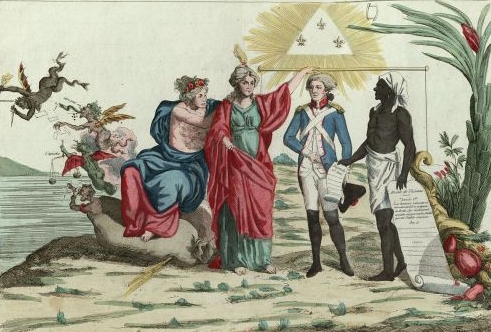
France and Haiti in Revolution: Race and the Rights of Man
HIST 3500
Jennifer J. Davis, Department of History
Did the French Declaration of the Rights of Man extend liberty and equality to all men throughout France and its empire, regardless of race? How did Haitians abolish slavery and establish a state dedicated to principles of liberty and equality? What role did race and racism play in debates about citizenship in France and Haiti? What connected these two revolutions that changed modern politics? This course proposes innovative answers to these questions, surveying the relationship between race and civil rights in the Age of Revolutions.
The French Revolution has been called both the cradle of modern democracy and the origin of the totalitarian state. The Haitian Revolution has been heralded as the only successful slave revolt to result in the abolition of slavery, and the creation of an independent state. The men and women who supported these Revolution have been hailed as idealistic heroes who refashioned their world according to egalitarian principles, and they have been reviled as bloodthirsty marauders.
The Haitian Revolution was linked to ideals articulated in France, but it was driven by the residents' ambitions and experiences within the colony. Connecting these revolutions is a research field of exceptional vigor with surprising connections to the early American republic, the American Constitution, and the institutions of enslaved labor across the Americas. We will host four internationally renowned scholars of Revolutionary France and Haiti on campus to discuss their published research, and present their latest work. This course invites OU students to join that conversation.
Public Lecture Series
The Department of History presents a public lecture series in conjunction with the Presidential Dream Course. Presentations are free and open to the public. For information or accommodation to events on the basis of disability, contact the Department of History at (405) 325-6002.
The Law of Slavery and the Problem of Rights in the Era of the Haitian Revolution

Wednesday, August 29, 2018
6:00pm
Fred Jones Jr. Museum of Art, Eddy Auditorium
View Lecture Flyer [PDF]
Malick Ghachem, Ph.D.
Professor of History, MIT
Professor of Law, University of Maine
Malick Ghachem is a historian and lawyer who holds a position as Senior Scholar at the University of Maine Law School, and one as Associate Professor of History at MIT. He is the author of The Old Regime and the Haitian Revolution (2012) which won the American Historical Association’s J. Russell Major prize and the Caribbean Studies Association’s Gordon K. & Sylvia Lewis Prize. He has published in American and comparative constitutional law, and is currently researching a book on the rise of the plantation complex in colonial Haiti.
Close Encounters: Blacks and Whites in the Haitian Revolution

Tuesday, October 2, 2018
6:00pm
Fred Jones Jr. Museum of Art, Eddy Auditorium
View Lecture Flyer [PDF]
Jeremy Popkin, Ph.D.
William T. Bryan Professor of History, University of Kentucky
Jeremy Popkin is the William T. Bryan Professor of history at the University of Kentucky in Lexington. He has published 19 books and over 150 articles on the French Revolution, the Haitian Revolution, and the role of newspapers and the press in modern politics. He has received a National Humanities Center Fellowship, residency at the Institute for Advanced Study at Princeton University, a Guggenheim fellowship, Fulbright fellowship and NEH fellowship. He has held visiting professorships in Germany, Australia, and France. His book, You Are All Free: The Haitian Revolution and the Abolition of Slavery, published with Cambridge University Press in 2010 won the David Pinkney Prize from the Society for French Historical Studies and the J. Russell Major Prize for the best book in French history from the American Historical Association. This book moves between events in the French Caribbean island of Saint-Domingue and debates regarding political rights for colonists, free people of color, and the abolition of slavery within the revolutionary legislatures back in France.
The Challenge of Black Citizenship

Tuesday, October 23, 2018
6:00pm
Fred Jones Jr. Museum of Art, Eddy Auditorium
View Lecture Flyer [PDF]
Lorelle Semley, Ph.D.
Associate Professor of History and Director of the Africana Studies Center,
College of the Holy Cross
Lorelle Semley is Associate Professor of History, Director of the Center for Interdisciplinary Studies, and Director of the Africana Studies Center at the College of the Holy Cross. She teaches courses in African history, French empire, gender, and the Atlantic world. Dr. Semley’s research spans continents, taking her from West Africa to France and the Caribbean. Her methods cross disciplines, incorporating texts, material culture, film, and literature. Her first book, Mother Is Gold, Father Is Glass: Gender and Colonialism in a Yoruba Town (Indiana University Press, 2010) analyzes how politics intersected with family relations during three formative periods: the Atlantic slave trade, French colonialism, and trans-Atlantic travel between West Africa and Brazil. This past year, she published To Be Free and French: Citizenship in France’s Atlantic Empire (Cambridge: CUP, 2017) which investigates how African people and their descendants around the French Atlantic engaged with discussions of human rights and political status during the revolutionary era.
Sovereignty, Race and Religious Dominion in the Aftermath of Revolution

Wednesday, November 14, 2018
6:00pm
Fred Jones Jr. Museum of Art, Eddy Auditorium
View Lecture Flyer [PDF]
Julia Gaffield, Ph.D.
Assistant Professor of History, Georgia State University
Julia Gaffield is Assistant Professor at Georgia State University, and the author of Haitian Connections: Recognition after Revolution in the Atlantic World (2015), awarded the Mary Alice and Philip Boucher Book Prize from the French Colonial Historical Society. Last year, she published an English-language annotated edition of the Haitian Declaration of Independence (2016). She is one of the most dynamic young scholars working in this field today embarking on a career that promises to transform what we know about early republican Haiti. She maintains a professional website:
She also provides early access to translations of archival documents regarding early Haitian history at the following address:
Prof. Gaffield has received fellowships to conduct research in France, Great Britain, and throughout the Caribbean, and has a knack for locating important “lost” documents, such as her fortuitous find of Haiti’s founding document misfiled in the British Library, noted in the 2010 NY Times article linked below: http://www.nytimes.com/2010/04/01/world/americas/01document.html

